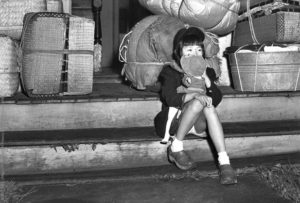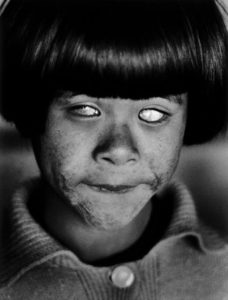The second World War (WWII) was the most widespread and lethal war in history. More than 30 countries were involved, resulting in more than 50 million military and civilian deaths (some estimates range in the 85 million range). So severe were the atrocities committed by the Nazis that most other aspects of this war have been nearly forgotten — first and foremost, the actions of the U.S. government and the events that led to the bombing of Hiroshima and Nagasaki.
The Coming of War
By the mid-1930’s it was clear to everyone that war was soon to come. Japan began to invade China, beginning with Manchuria, and in Germany, Adolf Hitler began his campaign to control the entire continent.
U.S. President, Franklin D. Roosevelt (FDR) became increasingly alarmed as Hitler’s invasions increased and news began to surface of the campaign against Germany’s Jewish population. In a 1937 speech in Chicago, FDR tried to rally the public’s support, but no further steps followed.
“To Most Americans, the threat arising from Japanese and German aggression seemed very distant. Moreover, Hitler had more than a few admirers in the Unites States. Obsessed with the threat of communism, some Americans approved his expansion of German power as a counterweight to the Soviet Union.” (Foner, 2014, p. 855)
Pearl Harbor
On December 7, 1941, Japanese planes bombed the naval base at Pearl Harbor in Hawaii. It wasn’t until Pearl Harbor that the citizens of the United States agreed to enter the war. They were the first attacks by a foreign power on U.S. soil since the War of 1812.
While the U.S. government did, in fact, intercept Japanese messages that revealed an attack in the Pacific Ocean was imminent, official reports claim that no one knew when or where the Japanese would strike. Nevertheless, there are many who believe FDR knew of the coming attack on Pearl Harbor beforehand and allowed it to happen so as to bring the United States into the war. It should be noted that official history records claim there is no credible evidence to support this charge.
Japanese-American Internment
Ten weeks after the attack on Pearl Harbor, FDR was persuaded by the military to issue Executive Order 9066. By this time, California already had a long history of aggression towards the Japanese, and now spurred on by exaggerated fears that the Japanese would invade the West (as well as an incentive to obtain Japanese-American property), those of Japanese descent were ordered to be removed from the West Coast.
Similarly, as Hitler had relocated Germany’s Jewish population to concentration camps, FDR removed more than 110,000 men, women, and children — two thirds of which were American citizens — to militaristic camps, far from their homes.
Life for Japanese-Americans at the internment camps was far better than that of the Jewish population of Germany, even still, they were most often subjected to quasi-military discipline and forced to live in horse stables, makeshift shacks, barracks, or tents behind barbed wire fences. Armed guards patrolled the compounds and searchlights scanned the grounds at all hours of the night. Privacy was scarce and medical facilities were non-existent.
This internment reveals just how easy it can be for war to undermine basic freedoms. “There were no court hearings, no due process, and no writs of habeas corpus,” (Foner, 2014, p. 877)
The press supported the action and the courts refused to intervene. The only political figure who spoke out against the U.S. government’s actions was Senator Robert Taft, of Ohio. It seems even average Americans (many of our grandparents and great-grandparents) were so consumed with their fear of the Japanese, that they too supported the executive order, much like the people of Germany were stirred to support the Nazis.
Something else that should be mentioned is the ‘loyalty oath program’ that the government established, which expected Japanese-Americans to swear allegiance to the U.S. government (the government that took them from their homes and imprisoned them with no charges) and enlist in the army. Those who refused to serve in the army (about 200 total), were sent to prison for resisting the draft. It wasn’t until 1988 that Congress issued an apology for internment and provided $20,000 in compensation to each survivor.
“The Most Terrible Weapon”
Franklin D. Roosevelt was the first (and only) president to win four elections; it was after his presidency that a two-term limit was set. Unfortunately, FDR didn’t live long enough to see the U.S. to the end of the war. On April 12th, 1945, he succumbed to a stroke, leaving Harry S. Truman as his successor.
Truman was presented with one of the most consequential decisions confronted by a U.S. president — whether or not to drop the atomic bomb on Japan. Truman was unaware of the bomb until after he became president and the Secretary of War informed him, calling it, “the most terrible weapon ever known in human history.” Truman’s theory: The bomb is a weapon, and weapons should be used.
On August 6th, 1945, an American plane dropped the first ever atomic bomb on Hiroshima.
70,000 innocent civilians were instantly incinerated and another 70,000 perished by the end of the year, due to radiation. It has been reported that thousands more died throughout the next five years. Why was Hiroshima targeted? Because it had not yet suffered any damage from the war.
Three days later, on August 9th, Nagasaki was bombed, killing another 70,000. While all wars inflict suffering on noncombatants, never before had civilians been so ruthlessly targeted.
There was considerable evidence to suggest that Japan was ready to surrender before the dropping of the atomic bomb. Many Japanese officials had already communicated a willingness to surrender if Emperor Hirohito could remain on his throne. This fell short of the demands for complete surrender, which was ultimately a justification for dropping the bomb, however interestingly enough, Japan was still allowed to keep their emperor in the end. Why would this be?
Some of the scientists who helped to create the bomb, urged Truman to use it in an effort to, “demonstrate its power to international observers,” (Foner, 2014, p. 888) and Truman did not hesitate. With the rising tensions with the Soviet Union and the coming of the Cold War, Truman wanted to show Joseph Stalin, and the rest of the world, the power of the United States. This is why thousands of innocent men, women, and children were annihilated.
By 1945, there were few Americans who objected to Truman dropping the bomb. This was due to four years of war propaganda that had vilified the Japanese to American eyes. Public doubts soon began to surface, however, especially after John Hersey published Hiroshima (1946), which provided a graphic account of the terrors suffered by civilians.
In this picture provided by Japan’s Association of the Photographers of the Atomic (Bomb) Destruction of Hiroshima, nuclear bomb victims are sheltered at the Hiroshima Second Military Hospital’s tent relief center at the banks of the Ota River in Hiroshima, Japan, 1,150-meters (1,258-yards) from the epicenter on Aug. 7, 1945, one day after the world’s first nuclear bombing by the United States. (AP Photo/The Association of the Photographers of the Atomic (Bomb) Destruction of Hiroshima, Yotsugi Kawahara, HO)
WWII had a massive impact on millions of people around the world, and from a multitude of nations. However, for Americans, one of the largest impacts on society was the treatment of the Japanese on our own soil, and the ultimate destruction of the Earth and its people. And yet, somehow, it’s rarely spoken of — a dark stain that most of our grandparents choose to forget.
Many of the actions taken by the U.S. can be considered similar to those of the Nazis, and to the Americans who take this into consideration, one can’t help but to contemplate the implications. What does this say about our society, and how has it effected the way we view the world today? Could history repeat itself, as it so often does?
Were it not for America’s intervention, it is very possible that Hitler would have won the war. Many of our family members fought and died in WWII, and we should honor their memories, and take pride in their accomplishments. That being said, we also have a responsibility to mankind to ensure each generation remembers our mistakes, and continues to learn from them.
The Real Reason American Dropped The Atomic Bomb: It Was Not To End The War
 Reviewed by Unknown
on
02:37:00
Rating:
Reviewed by Unknown
on
02:37:00
Rating:
 Reviewed by Unknown
on
02:37:00
Rating:
Reviewed by Unknown
on
02:37:00
Rating:




Today, seeing your post, it seems that I have stepped into a very beautiful world, the content of your post has been written in a very beautiful way, you have put your thinking in your words.
ReplyDeletesector18 call girls
sector 16 call girls
Gurugram Escorts
Gurugram escorts agency
Your article is different from everything else, this post of yours is an inspiration for today's young generation.Seeing such articles from you, I also feel like I should make a personal blog of my own.
ReplyDeleteCall Girls In Surazkund
Bhiwadi Escorts Service
Call Girls Huda City Center
Manesar Escorts Service
Gurugram Call Girls
Guurgram Call Girls
Gurugram Call Girls
Call Girls Gurugram
Very good post is a post, you salute me, I think on your thinking that I should make a nice blog like you but then when I look at your blog, I think I will not be able to be like you.Can you tell if this recipe was on my Instagram account.
ReplyDeleteCall Girls Sector 15
Airhostess Call girls Gurugram
Call Girls Phase 1
Independent Call Girls Chennai
Call Girls Dharuhera
call Girls M.G. Road
Manesar Escorts Service
Gurugram Escorts Service
All the posts on one side and your post on one side, even after that, your post will look very lot of comment, see it all around, but it is nice to see your comment is very differents
ReplyDeleteCall Girls Sector 1
Call Girls In Noida
Call Girls Sushant Lok
Call Girls Palam Vihar
CAll Girls Huda Metro
Call Girls Phase 1
Call Girls phase 2
Thanks for shareing comments
ReplyDeleteThe artistry of Luxury and elegance with the most premium and VIP model girls in Delhi Sara Mittal. This Independent girls invites the elite to savor the luxury girls services for high profile people.
ReplyDeleteRussian girls Delhi
Connaught Place girls
Celebrity girls Delhi
model girls Delhi